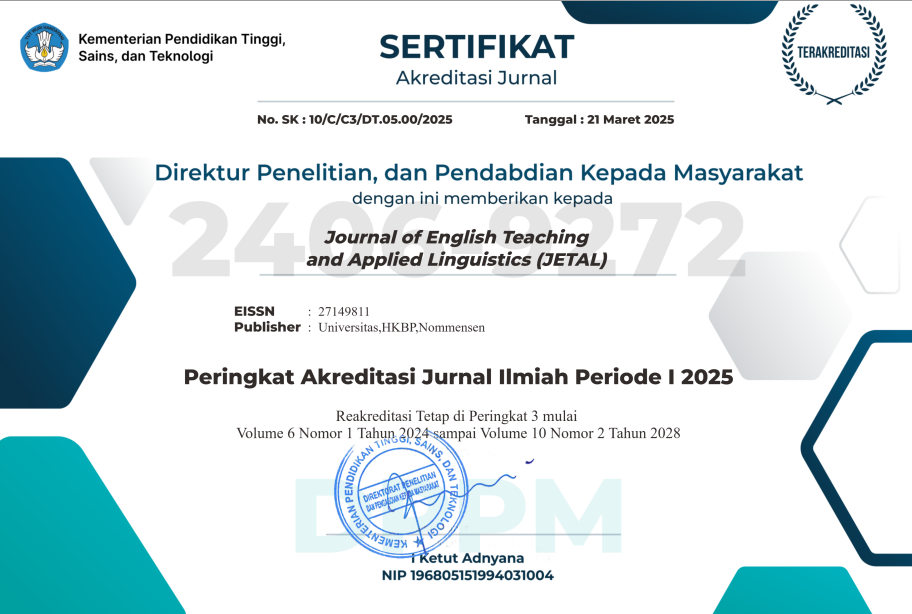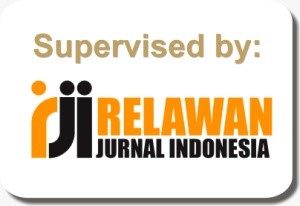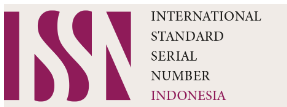Investigating EFL Teachers’ Perceptions Towards Professional Engagement
Abstract
Teacher professional engagement is essential in driving success in education, both in student and teacher personal development. This study aims to determine EFL teachers' perceptions of professional engagement in terms of commitment to the profession, devotion to the profession and dedication to students. The data was collected from 107 EFL teachers. This study uses a quantitative descriptive approach. The Teacher Professional Engagement Scale Questionnaire (TPES) was used to collect the data. The results of this study, it was found that the subscale of teachers' commitment to their profession obtained the highest results with 94.4% strongly agree. This study also helpful for showing how much teachers' professional engagement level is in their work.
References
Aronson, B. D., & Janke, K. K. (2015). Rules of Engagement: The Why, What, and How of Professional Engagement for Pharmacy. INNOVATIONS in Pharmacy, 6(3). https://doi.org/10.24926/iip.v6i3.387
Bashir, L. (2017). Job Satisfaction of Teachers In Relation to Professional Commitment. International Journal of Indian Psychology, 4(4). https://doi.org/10.25215/0404.007
Butucha, K. G. (2013). Teachers’ perceived commitment as measured by age, gender and school type. Greener Journal of Educational Research, 3(8), 363–372.
Carbonneau, N., Vallerand, R. J., Fernet, C., & Guay, F. (2008). The Role of Passion for Teaching in Intrapersonal and Interpersonal Outcomes. Journal of Educational Psychology, 100(4), 977–987. https://doi.org/10.1037/a0012545
Coladarci, T. (1992). Teachers” sense of efficacy and commitment to teaching. Journal of Experimental Education, 60(4), 323–337. https://doi.org/10.1080/00220973.1992.9943869
Dilekçi, Ü., & Limon, İ. (2020). The Mediator Role of Teachers’ Subjective Well-Being in the Relationship between Principals’ Instructional Leadership and Teachers’ Professional Engagement= Okul …. Educational Administration: Theory & Practice, 26(4), 743–798. https://doi.org/10.14527/kuey.2020.017.
Elrayah, M. (2022). Improving Teaching Professionals’ Satisfaction through the Development of Self-efficacy, Engagement, and Stress Control: A Cross-sectional Study. Educational Sciences: Theory and Practice, 22(1), 1–12. https://doi.org/10.12738/jestp.2022.1.0001
Firestone, W. A., & Pennell, J. R. (1993). Teacher Commitment, Working Conditions, and Differential Incentive Policies. In Review of Educational Research (Vol. 63, Issue 4). https://doi.org/10.3102/00346543063004489
Fox, R. B. (1964). The “committed” teacher. Educational Leadership.
Fried, R. L. (2001). The Passionate Teacher: A Practical Guide.
Granziera, H., & Perera, H. N. (2019). Relations among teachers’ self-efficacy beliefs, engagement, and work satisfaction: A social cognitive view. Contemporary Educational Psychology, 58, 75–84. https://doi.org/10.1016/j.cedpsych.2019.02.003
Klassen, R. M., Aldhafri, S., Mansfield, C. F., Purwanto, E., Siu, A. F. Y., Wong, M. W., & Woods-Mcconney, A. (2012). Teachers engagement at work: An international validation study. Journal of Experimental Education, 80(4), 317–337. https://doi.org/10.1080/00220973.2012.678409
Kozikoglu, I., & Ozcanlı, N. (2020. (2020). The relationship between teachers’ 21st century teaching skills and their engagement to the profession. Cumhuriyet International Journal of Education, 9(1), 270–290. https://doi.org/10.30703/cije.579925
Kozikoglu, I., & Senemoglu, N. (2021). Predictors of the challenges faced by beginning teachers: Pre-service teacher education competency and professional commitment. Research in Pedagogy, 11(1), 1–16. https://doi.org/10.5937/istrped2101001k
Kozikoğlu, İ., & Senemoğlu, N. (2019). Development of teachers’ professional engagement scale: A study on validity and reliability
Öğretmenlik mesleğine adanmışlık ölçeğinin geliştirilmesi: Geçerlik ve güvenirlik çalışması. Journal of Human Sciences, 15(4), 2614. https://doi.org/10.14687/jhs.v15i4.5389
Schaufeli, W. B., & Bakker, A. B. (2004). Job demands, job resources, and their relationship with burnout and engagement: A multi-sample study. Journal of Organizational Behavior, 25(3), 293–315. https://doi.org/10.1002/job.248
Shann, M. H. (1998). Professional commitment and satisfaction among teachers in urban middle schools. Journal of Educational Research, 92(2), 67–73. https://doi.org/10.1080/00220679809597578
Shukla, S. (2014). Teaching competency, professional commitment and job satisfaction-a study of primary school teachers. Journal of Research & Method in Education, 4(3), 44–64.
Solomon, C. B. (2008). The relationships among middle level leadership, teacher commitment, teacher collective efficacy, and student achievement.
Tarihi, G., Keskin, A., & Zaimoğlu, S. (2021). An Investigation of Turkish EFL Teachers’ Perceptions of Professional Identity* Türk Yabancı Dil Öğretmenlerinin Mesleki Kimlik Algılarının Araştırılması. Çağ Üniversitesi Sosyal Bilimler Dergisi Cilt, 18, 82–95. https://dergipark.org.tr/cagsbd
Tyree, A. K. (1996). Conceptualizing and measuring commitment to high school teaching. Journal of Educational Research, 89(5), 295–304. https://doi.org/10.1080/00220671.1996.9941331
Watt, H. M. G., & Richardson, P. W. (2008). Motivations, perceptions, and aspirations concerning teaching as a career for different types of beginning teachers. Learning and Instruction, 18(5), 408–428. https://doi.org/10.1016/j.learninstruc.2008.06.002
Watt, H. M. G., Richardson, P. W., & Wilkins, K. (2014). Profiles of professional engagement and career development aspirations among USA preservice teachers. International Journal of Educational Research, 65, 23–40. https://doi.org/10.1016/j.ijer.2013.09.008
Authors retain copyright and grant the journal right of first publication with the work simultaneously licensed under a Creative Commons Attribution-ShareAlike 4.0 International License (CC BY-SA 4.0) that allows others to share the work with an acknowledgment of the work's authorship and initial publication in this journal.
Authors are able to enter into separate, additional contractual arrangements for the non-exclusive distribution of the journal's published version of the work (e.g., post it to an institutional repository or publish it in a book), with an acknowledgment of its initial publication in this journal.
Authors are permitted and encouraged to post their work online (e.g., in institutional repositories or on their website) prior to and during the submission process, as it can lead to productive exchanges, as well as earlier and greater citation of published work (See The Effect of Open Access).






